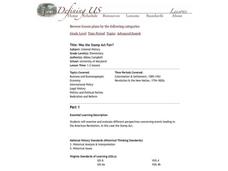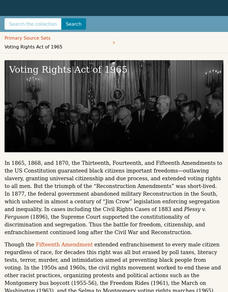Curated OER
Consequences of the Sedition Act
Students research and discuss the consequences of the Sedition Act. They illustrate the difficulty of balancing security needs and personal freedom using an example from John Adams's presidency.
Curated OER
Was the Stamp Act Fair?
Elementary and middle schoolers examine and evaluate different perspectives concerning events leading to the American Revolution. In this case, they hone in on the Stamp Act. They research controversial bills, laws, or events of the time...
Curated OER
Not Getting the News about the Stamp Act
How did American colonists react to the Stamp Act of 1765? Your young historians will examine primary source material by reading excerpts from a transcription of the Pennsylvania Gazette and then identifying the sentiments expressed...
Curated OER
For The Sake Of Security: U.S.A. Patriot Act & Bill of Rights
A substantive New York Times article about the U.S.A. Patriot Act, military tribunals, racial profiling, and the Bill of Rights forms the basis for a discussion of the complex interplay of fundamental American rights and the aftermath of...
K20 Learn
American Exclusivity: The Chinese Exclusion Act
The Chinese Exclusion Act—the first race-based immigration restriction—is echoed in today's debates on the topic. Using graphic organizers and structured discussions, historians consider the reasons behind the act and compare the...
DocsTeach
The Civil Rights Act of 1964 and the Equal Employment Opportunity Commission
1964: A victory for the civil rights movement! Scholars read a section of the Civil Rights Act of 1964 and discuss what affirmative actions means to them. The resource is a jigsaw activity, with each group focusing on one section of the...
Center for History Education
Was the Stamp Act Fair?
Pledge your loyalty to the king and the Stamp Act or sign an oath against the tax. After simulating an in-class tax for school supplies, young historians consider the reasons for the Stamp Act and similar colonial policies. The...
Constitutional Rights Foundation
Educating About Immigration The DREAM Act
Group members role play state legislators, supporters of and opponents to the The DREAM Act (Development, Relief, and Education for Alien Minors). After listening to the arguments put forth for and against the immigration...
Angel Island Immigration Station Foundation
The Chinese Exclusion Act
As part of a study of Angel Island Immigration Station, young historians examine the Chinese Exclusion Act of 1882, the first restriction on the United States immigration based on race and nationality. They complete a matrix identifying...
Smithsonian Institution
Us vs. Them: The Chinese Exclusion Act of 1882
Immigration issues are nothing new. An interesting lesson plan focuses on the racially motivated Chinese Exclusion Act of 1882 and its impact on the Chinese American community. Scholars read articles, analyze political cartoons, and...
Teaching for Change
A Documents-Based Lesson on the Voting Rights Act
How did the Voting Rights Act affect the daily lives of American citizens? A document-based lesson developed by the Student Non-Violent Coordinating committee (SNCC) presents a case study of the impact of the Voting Rights Act of 1965 on...
Curated OER
Random Acts of Kindness For Kids
Develop a world-wide, email chain on which class members can showcase their acts of kindness. After defining the meaning of random acts of kindness through discussion and through a reading of Random Acts of Kindness,...
Curated OER
Active Viewing: Savage Acts
Based on the documentary film Savage Acts: Wars, Fairs, and Empire, this lesson explores concepts of National interests and imperialism. They view sections of the film and share which images exemplify the meaning of each vocabulary term....
Curated OER
Taxes in U.S. History: The Social Security Act of 1935
High schoolers explain the history of the Social Security Act and the FICA tax. They describe what Social Security is and whom it is intended to help. They explain the purpose of the FICA tax.
Digital Public Library of America
Voting Rights Act of 1965
Despite the passing of the Thirteenth, Fourteenth, and Fifteenth Amendments, as well as the passing of the Voting Rights Act of 1965, the struggle to ensure fair voter registration and election procedures continues. Young historians...
NET Foundation for Television
1850-1874 Homestead Act Signed: Who were the Settlers?
Life in the great, wide-open spaces of the West! Scholars analyze the reasons behind the vast movement to the Great Plains after the passing of the Kansas-Nebraska Act and the Homestead Act. Using photographic, document, map, video, and...
NET Foundation for Television
1850-1874 Homestead Act Signed: The Challenges of The Plains
Start a whole new life in a land known as the Wild Wild West! Learners analyze maps, personal accounts, the Kansas-Nebraska Act, songs, and video clips to uncover life under the Homestead Act. Using their new skills, class members role...
Anti-Defamation League
What Is the Dream Act and Who Are the Dreamers?
The DREAM Act (Development, Relief, and Education for Alien Minors Act) is the focus of a lesson that asks high schoolers to investigate the act's provisions and read statements by individuals who support and oppose the act. They then...
DocsTeach
The Impact of the Immigration Act of 1924
Welcome to America ... only if you're on an approved list. The activity uses a map to explain how the Immigration Act of 1924 placed quotas on immigration from certain countries, such as India. Scholars analyze the map, complete a...
ReadWriteThink
Living the Dream: 100 Acts of Kindness
Inspire kindness in and out of school with a lesson plan that challenges scholars to perform 100 acts of kindness during the time between Martin Luther King Jr. Day to Valentine's day. Leading up to a celebration of friendship,...
Curated OER
Espionage and Sedition Acts: Mock Trial
Bring to life the severity of the Espionage and Sedition Acts through a mock trial. Learners have prior knowledge of WWI and the context of these acts. An anticipatory set gets the class discussing the ethics of wartime dissension, and...
Curated OER
Thomas Jefferson on the Sedition Act
Students research and cite arguments Jefferson used in objecting to the Sedition Act. They discuss Jefferson's opinion on how constitutional questions about the Sedition Act could be resolved.
Curated OER
From the President's Lips: The Concerns that Led to the Sedition (and Alien) Act
Young scholars research and briefly summarize the international situation during John Adams's presidency. They list the concerns that led to the Sedition Act and describe it.
National Endowment for the Humanities
Lesson 2: The Debate in Congress on the Sedition Act
Pupils research and discuss the provisions in the Constitution that supported the arguments for and against the Sedition Act. They articulate objections to and arguments in favor of the Sedition Act.
Other popular searches
- Drama Acting Exercises
- Drama Acting
- Acting Out Nursery Rhymes
- Acting Exercises
- Acting Out Short Stories
- Shakespeare Acting
- Acting Scenes
- Acting in the Theatre
- Acting in Films
- Acting Skills
- Reading Acting
- Classical Acting























